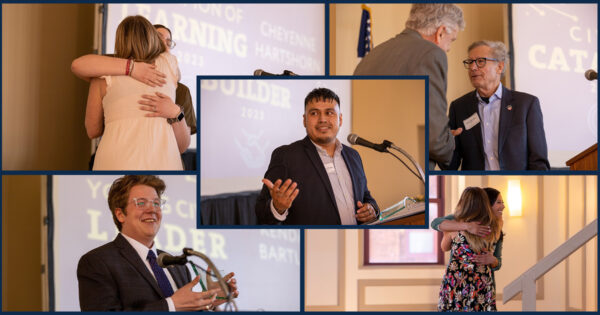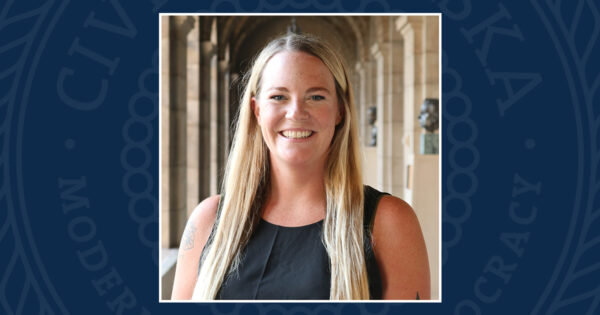Good morning.
I’m glad to be here with you today, instead of being out raking leaves. It seems too soon. But the evidence of fall is, literally, all around. Our big oak tree in our backyard is losing more and more of its canopy every day. Another sign of the season is that, during our neighborhood walks, the ones Kathy and I take after work are now ending in twilight.
It’s autumn. And: It’s election season! But, we finally are in the home stretch of this campaign. It’s true, I swear. And I detect a wee bit of enthusiasm out there. Look at the jump in first-time voters, who are breaking records this year. That makes democracy stronger. Seeing so many young people turning their summer activism into meaningful civic action is amazing. It’s like watching an anti-venom getting pumped into our national bloodstream. We’re showing up – and it feels good.
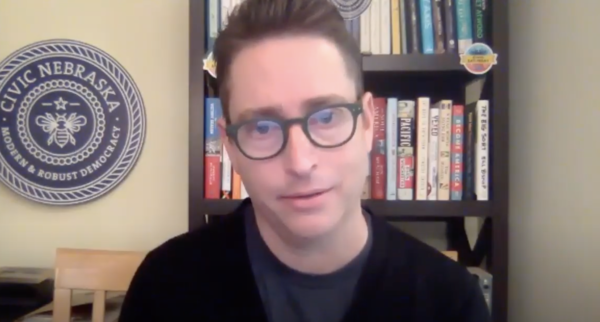 But, let me confess to you my favorite thing about fall. It’s depressingly shallow on my part.
But, let me confess to you my favorite thing about fall. It’s depressingly shallow on my part.
More pockets.
This is because when I leave the house, I carry a lot of stuff. My keys, my phone, my wallet, my reading glasses, my sunglasses … and now, of course, with coronavirus, a mask, hand sanitizer, a Baggie with Clorox wipes – if this virus is not an argument for cargo pants to become cool again, I don’t know what is. So in today’s world, more pockets are a godsend. We are carrying a lot of things these days. Sometimes, too much.
Pockets have been on my mind lately. In every sense of the word. “Pocket” conveys a kind of insulation and coziness. And, we all have our pockets. Especially in the figurative sense.
Let me tell you about mine and Kathy’s. It’s our neighborhood. We stumbled onto it 20 years ago, when we were buying our first house. We told our Realtor we wanted to live in an established neighborhood – no houses taller than the trees. Maybe a brick two-story, with some nice wood floors. And, she found us our house. And then, before the next election that November, what did we see? Signs popping up everywhere for our candidates and our issues. We’d moved into a like-minded area of Lincoln without really planning it.
As it turns out, Kathy and I are not really unique in this. As it turns out, American neighborhoods are becoming increasingly filled with people who live, think, and vote alike. Look around, and you know this to be true. We can choose the neighborhoods, businesses, news sources, social media platforms, churches, and – of course – the politics that suit our lifestyle.
This is something social scientists call assortative behavior. Birds of a feather flock together. I often call it “Pocket Democracy.” And boy, it is on display right now. Right now, you’ve basically got block-by-block political sign warfare going on. Or flags. Or window treatments. Or bumper stickers.
Well, today, I want to talk about Pocket Democracy, especially in those times when we AREN’T electing new leaders. I want to set aside the election to talk about how we live the rest of the time, and how we’re fragmenting and splintering and filtering into like-minded groups.
First, let’s look at how we got to this point.
Second, let’s consider the effects of Pocket Democracy. What does it do to us?
And finally, let’s think about how we navigate through it. And move forward together.
Pocket Democracy didn’t happen overnight. And it didn’t happen by accident.
In his book The Big Sort, Bill Bishop explains how in the mid-1970s, Americans began clustering into more and more granular communities of sameness. This “Big Sort,” he wrote, was happening at the same time as other social and economic changes in America.
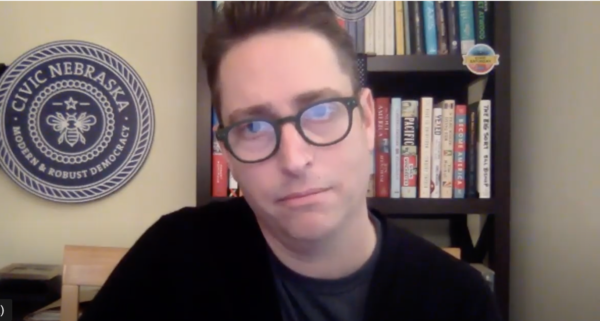 To understand, let’s zoom back to 1976. We’d be surprised at how different civic life looked compared to today. There were Elks Clubs, Jaycees, American Legions, and Legion Auxiliaries. The pews were full in our Lutheran and Methodist churches. There were newspapers on nearly every doorstep. Walmart was still almost a decade away from setting foot in Nebraska – so our Main Streets still had appliance dealers, clothing shops, dime stores, and hardwares. Plus, all the interaction that went with all of that. Our commercial centers were still civic centers.
To understand, let’s zoom back to 1976. We’d be surprised at how different civic life looked compared to today. There were Elks Clubs, Jaycees, American Legions, and Legion Auxiliaries. The pews were full in our Lutheran and Methodist churches. There were newspapers on nearly every doorstep. Walmart was still almost a decade away from setting foot in Nebraska – so our Main Streets still had appliance dealers, clothing shops, dime stores, and hardwares. Plus, all the interaction that went with all of that. Our commercial centers were still civic centers.
I’m no social scientist, but here’s the gist of what happened. Americans became more broadly affluent in the second half of the 20th Century. That increased our options, in all facets of life. And so, gradually with the help of technology, the old institutions around land, family, class, tradition – even religion – began to give way.
In their place, a new order emerged. This order was based on the notion of individual choice. The era of hyper-individualism was upon us.
What was Burger King’s motto during this time? Have It Your Way? We have it our way today. Just to use me as an example: In 2020, my Nissan-driving, HBO-watching, Fair Trade-coffee drinking, dual-income-no-kids household is tucked away in a solidly Blue neighborhood. We visit the local co-op, we shop at like-minded businesses, we heart public schools, and we support community artists.
Just a few miles away – a five-minute drive, maybe – my former co-worker has a Ford F150 in his three-car driveway. He watches Blue Bloods and Live PD. He eats at Chick-Fil-A. He goes to the megachurch on 70th. And, I’m pretty sure he has me muted on Facebook.
Which, of course, is worth noting: We’re spending more and more time in our virtual pockets, and that’s accelerated the divide. Bill Bishop wrote The Big Sort in 2008. That was just as Facebook and Twitter were going mainstream. Social media has tightened its grip on nearly every aspect of our lives – particularly in a pandemic, with our screens becoming the safest way to interact with one another. And yet, we don’t. We have the ability to exchange ideas with anyone at our fingertips, and what do we do? Well, sure, cat videos. But mainly, we go find stuff that we agree with.
You might be honestly thinking: Is this an entirely bad thing? In a world that is literally on fire, what’s wrong with retreating to a safe space at the end of the day? Why is being around people you like, people who share your sensibilities, people who will let you drop your guard for a little while, Why is that something to be wary of? Birds of a feather flock together, right? And why, Steve, do people like you always try to get me to engage with people I don’t like?
That brings me to my second thought: What does Pocket Democracy do to us?
Well, for one, it’s important to remember that not everybody has gotten to live a life filled with lots of choices. Not everyone has the luxury of picking from a dozen different paint colors for the new kitchen. Some people are stuck in place and have been for years. We used to have evenly-spread prosperity in the United States. Now, our economy has splintered into geographies of winners and geographies of losers. And that means all of the awful cultural, and social, and political problems that we see every day. Pocket Democracy is harsh and angry. Mere political differences are now deep-seated divisions over our very values, our very identities. We’ve gotten really good at being victims, and so we like our politics when they can be used to punish others.
This is what demagogues feed on.
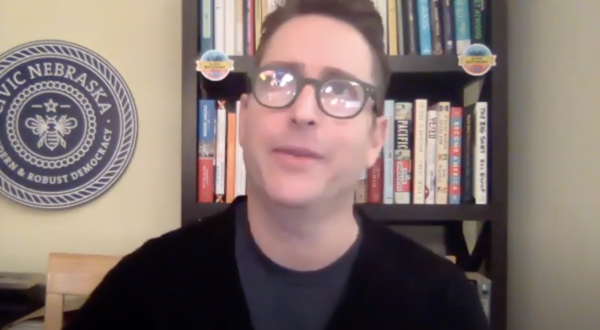 You would think that the safety of being in a strictly like-minded community would bring a kind of peace and confidence – a refuge. But, it’s actually been the opposite. More often, we become more extreme in these homogeneous environments.
You would think that the safety of being in a strictly like-minded community would bring a kind of peace and confidence – a refuge. But, it’s actually been the opposite. More often, we become more extreme in these homogeneous environments.
This makes sense if you think about it: Lock-stepped groups create a self-justifying feedback loop. In the case of our interactions in our little pockets, this means an unspoken competition of sorts to be the brightest Red or deepest Blue member of our chosen group.
The best example of this is talk radio. The more extreme the ideologue, the better their ratings. I can look down my block and see it, too. It’s not enough to have a Biden sign in the front yard. To be a Real Democrat, you’ve also got to have ones that say “Grab Him By The Ballot,” or “Any Functioning Adult 2020.”
Pocket Democracies grow on moral certitude and ideological purity. In a Pocket Democracy, we are not self-governing individuals. We don’t make our choices as the result of careful research or after coming to a well-informed opinion. We cast them as an after-the-fact affirmation, a confirmation of our status within our chosen group. We do citizenship backward.
Along the way, we leave a lot of wreckage. Friendships end. Family relationships get strained. Workplaces become divided.
With each parting of the way between parent and child, our Pocket Democracy tightens.
With every lifelong friendship broken over partisan lines, our Pocket Democracy hardens.
With every mean-spirited exchange on Facebook, our Pocket Democracy crystallizes.
It takes a toll on us all. All of us are affected by this. We all carry the burdens of shattered relationships and the death of discourse.
We can do better. We have to do better.
To be clear, I’m not suggesting we chum up to white supremacists in a sincere attempt to understand where they’re coming from. In a democracy built on equality, inclusion, and love, certain moral boundaries remain non-negotiable. And I’m not even saying that we shouldn’t be partisan. In fact, it’s impossible right now. Be partisan, and be political, whatever that means to us personally right now. Part of being active, responsible citizens is to publicly lend support to – and to work for – the candidates and causes that we believe in. This isn’t a call to get a political lobotomy.
But here’s the deal: At some point, the ballots will all be counted, and a winner will be declared. There will most likely be angst and anger, maybe even danger if we’re to believe some headlines. But at some point, the counting ends, and life – such as it is – will go on.
Then what?
You wouldn’t be here today if you weren’t wondering this, too. I know you feel that same longing for connection, for a common purpose, as I do. A return to what unites us, no matter how counter to the current culture that may feel. You’re here because you want to be a civic actor and not a passive consumer of democracy.
I’m here to tell you that it’s going to take courage.
It will take courage because our society and politics and culture have made it too easy to simply choose not to be an active citizen. To turn the channel over to the game, or spend the day looking for easter eggs in the latest Marvel trailer. Anything to keep us from really engaging with one another.
And the less we interact with those who don’t think or pray or vote like us, the more distrustful we become. We believe the worst in one another. We genuinely believe the “other side” is more extreme and radical than they really are. We reduce people to caricature. It’s no wonder that our elections have become end-all-be-all conflicts – they’re not contests over policy anymore, but battles over our very way of life.
So what do we do?
Let’s finish up today by charting something of a path forward. As usual, I’m good at the diagnosis, not so great with prescribing a treatment. But one place to start, if we’re still carrying the metaphor, is to remember that pockets can be warm and cozy, but you really can’t see out of them.
Despite all the noise in our echo chambers, despite what they do to distort our view of others, the good news is this – our perceptions are not always reality. We Americans still tend to be more alike than we think. The research tends to confirm this. Take an issue. Take immigration. In a 2019 study, Republicans said they believed that seven in 10 Democrats supported completely open borders. In reality, fewer than four in 10 do. And, not to be outdone, in that same study Democrats believed that only maybe half of Republicans think properly controlled immigration is good for America. The actual support among average Republicans is eight in 10.
One set of numbers adds up to hateful caricature. The other set suggests a much more platonic truth.
This doesn’t mean we don’t have clear differences. Of course we do. But we are not our caricatures. Remember this. Remember this when summoning the fortitude to start a difficult conversation.
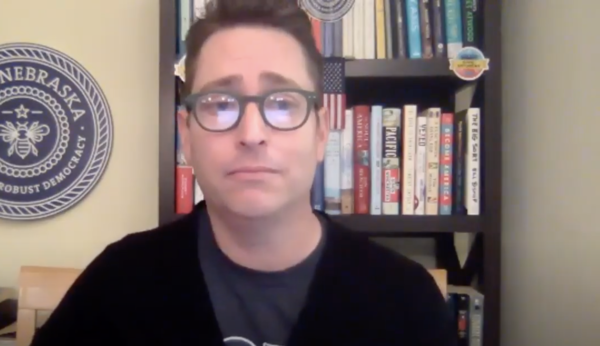 We have to find the courage to talk with one another again. Without abandoning our most cherished, and most deeply-held beliefs, we have to find the courage to listen to one another again.
We have to find the courage to talk with one another again. Without abandoning our most cherished, and most deeply-held beliefs, we have to find the courage to listen to one another again.
John Dewey said “Democracy begins in conversation.” He’s right. Our humanity – our civil society – is not judged by how neatly we agree. The notion that we’ll somehow compel everyone to agree is ludicrous. No! Our humanity and our society are judged by how we can disagree so passionately and so personally, and yet – and yet! – despite all that, still carry out this great American experiment together.
Democracy begins in conversation. Hard conversation.
This is not supposed to be easy. Nothing great ever is.
We must be brave. Democracy is not for the meek. It is for a courageous people. It’s for a curious and creative people. It’s for a practical and humble people. And democracy is for a compassionate and, yes, a loving people. All of these qualities emerge when we talk, and when we listen.
Democracy begins in conversation. It is forged in our discourse. It is sustained through our discussions. And it is advanced by honest dialogue and in the exchange of our ideas, our opinions. For centuries, from our town halls to our statehouses, from our high-school gyms to our water coolers, Americans have gathered, listened to each other, debated, made up our minds, and then moved forward together.
We’ve done it before. We can do it again.
It’s an exciting time for our nation. Elections always are. But, soon enough, this endless 2020 campaign will finally pass into history. Soon enough, the yard signs will come down. And the rhetoric will cool. Because, by their nature, elections must end. But by necessity, our American conversations must continue. That is democracy.
In 2020 – and beyond – let’s empty our pockets. Let’s get rid of what keeps us from talking with … and listening to one another. And let’s fill them with the courage to carry on.
Thank you.
Visit CivicNebraska.org for tools and resources to start difficult conversations.
